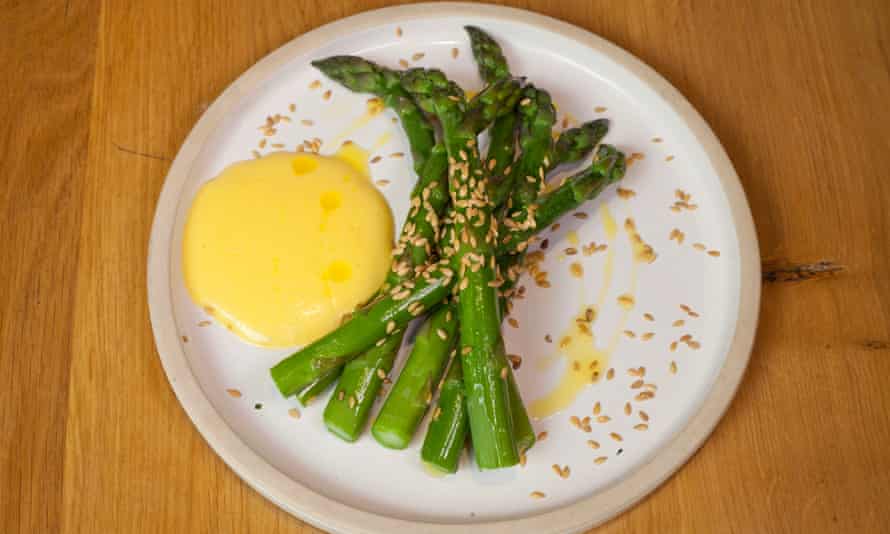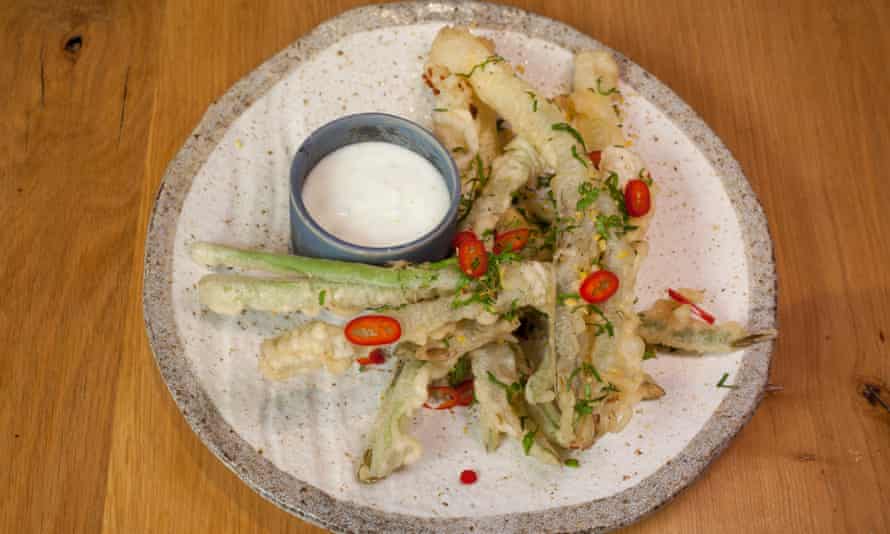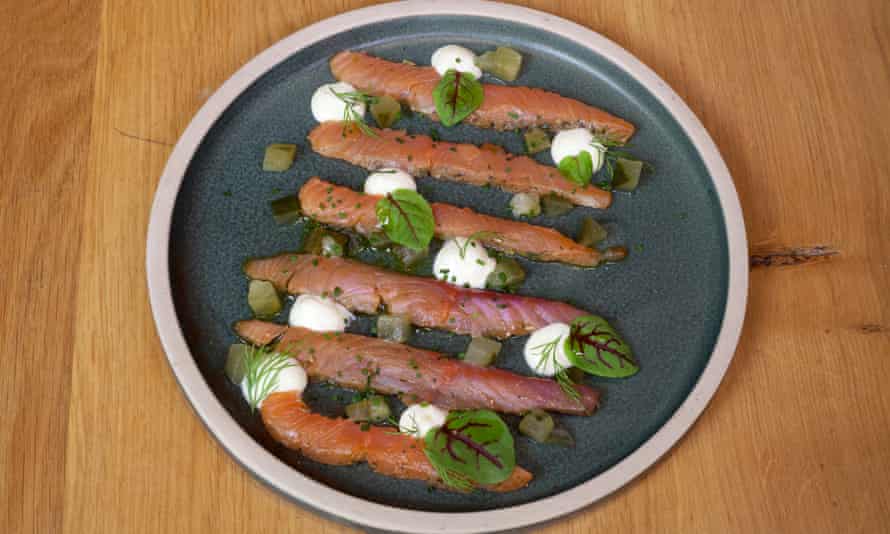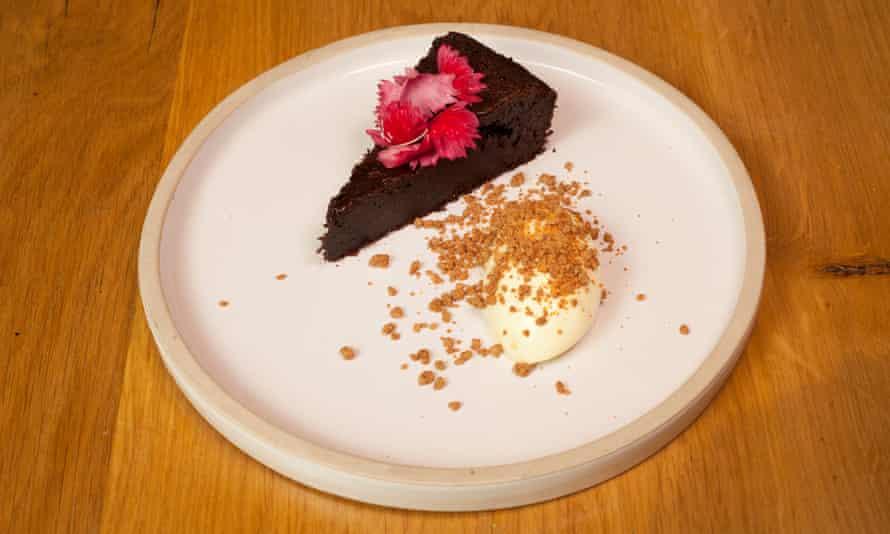Sussex Bar & Restaurant, 63–64 Frith Street, London W1D 3JW (020 3923 7770). Snacks £2-£7, starters £9-£14, mains £18-£24, desserts £6, wines from £32
Just as the Inuit are reputed to have many words for snow, so the people of Sussex, both East and West, are said to have many words for mud. A lot of them have a pleasing onomatopoeic squelch. There is “gawm”, for the nastiest-smelling kind of mud and “stodge” for the thickest pudding-like type. There is “swank” for a muddy bog and “stug” for watery mud, and “gubber” for a trench of rotting matter. I like the industrious, grinding Sussex represented by this nerdy vocabulary. People who work the land need the brevity provided by such words.
Even so, I don’t want to spend much time there. I am very much happier in the version of Sussex currently trading under that name from the venerable premises at 63-64 Frith Street in London. For a long time, it was the bistro where the great Bruno Loubet first paired scallops with black pudding. For a decade after that it was Arbutus, the flagship restaurant of chef Anthony Demetre, where you would always be fed very well indeed. London’s Soho has many places in which you can eat; surprisingly few of them are the sort where both you and the kitchen are invited to take your dinner seriously.

Sussex stands in the noble tradition of what has gone before. It is the fourth restaurant from the Gladwin brothers, who also have The Shed in Notting Hill, Rabbit on the King’s Road and Nutbourne in Battersea. All of them big up the fact that they source a lot of their produce and some of their wines from the family farm in West Sussex. Apparently, it’s countryside cooking in the city. Inside, there is black-painted half-wood panelling and squelchy banquettes and the general mood of being in the dining room of a Farrow & Balled pub somewhere just outside Pulborough, where the air smells lightly of cow parsley and dung.
It’s a conceit, of course. All city restaurants get the food they serve from outside the city, unless they’re bagging tubercular squirrels on the quiet in Soho Square or foraging down Park Lane’s fox-piss-stained central reservation. Which they aren’t. But it’s a conceit into which I am very happy to buy. For reasons of pandemic travel advice and my own settling mobility, leaving the capital has proved tricky. Here might be a way to do it.

Kind of. There are clear outbreaks of Vaughan Williams Englishness; of food, from a kitchen led by Oliver Gladwin, best eaten to strains of The Lark Ascending. But there is also cosmopolitan inquisitiveness. From the snacks menu come spring onions tempura, the fat alliums presented in a lacy batter and served with a lime-spritzed yoghurt dipping sauce. Sussex chorizo turns up as rich, crunchy-shelled croquettes. And then there are Marmite eclairs: choux pastry buns filled with a truffled mushroom duxelles given a salty push courtesy of the yeast extract. It’s an eye-widener. Just one of those does the job. Or perhaps none, if Marmite isn’t your thing.
It’s the starters which give a real sense of where we’re going here, which is out into the meadow. There are brilliant orange ribbons of cured trout, with proper bite and flavour, alongside diced pickled cucumber, cultured cream and dill. And then the star of the show: spears of asparagus of the deepest green, with dollops of a sprightly, frothy hollandaise made by someone who has whipped up a lot of it, and understands the mechanics of the emulsion. Many plates of these go out, a robust testament to the enduring appeal of simple things.

Mains are robust and sturdy in a very good way. The specials include a hefty beef Wellington for two. There’s a thick fillet of cod with paunchy mussels in the shell, new potatoes and a ripe oyster velouté. A disc of confited, then crisped lamb shoulder with deep-fried sweetbreads comes with one of those richly reduced meaty sauces that leaves you smacking your lips. It also come with “seed clusters”. Ah yes, the seeds. They are what I’d call a recurring motif, if that didn’t make it sound more agreeable than it is. Somewhere in that kitchen there is a huge box of mixed seeds and they are damn well going to use them, a blunt signifier of countryside. The asparagus are scattered with them. The side of hispi cabbage is littered with them, like the wind just blew them off a field. For an older clientele given to cavities, it’s not always welcome. You try getting a dental appointment right now. Enough with the seeds already. All of the great dishes upon which they appear would still be great without them.
The opening price for wines is £32 a bottle which, worryingly, is starting to look like the norm in the capital right now. It is entirely possible to find reasonable wines that, even when marked up by a multiple of three, puts them in the mid to low 20s. They do, however, get credit for a lengthy list by the glass. We have a bottle of the Nutbourne chardonnay from the family vineyard and it is a crisp, bright chablis-like joy. Service is slick, cheery, informative, in a minor public school way, and knows when it’s not needed.

There’s an awful lot to like about Sussex. I want to be able to carry that love through to dessert, but I can’t. I was hoping for a classic Sussex pond pudding, though I can see that on a warm summer’s night, a sweet suet crust filled with a whole lemon, sugar and butter with its own gravitational pull might not sell. A squidgy chocolate and hazelnut torte with crème fraîche is fine. Honeycomb with mascarpone sounds like a great idea but isn’t. There are three huge boulders of honeycomb, like the monoliths the apes throw sticks at in Kubrick’s 2001. They are stuck to the plate by small splodges of mascarpone. At this volume, the honeycomb is a fizzing bomb of bicarb. The only other choice is a strawberry mess. Dessert feels like an afterthought.
On a central serving station, I spot a selection of English cheeses; hard, craggy, buttercup-yellow cheddars and pale soft cheeses trying to make a run for it. I rarely order cheese in restaurants. It’s mostly a victory of shopping. But at Sussex right now that may be the best way to go. Unless, of course, you really, really like honeycomb. After all, it can be a cracking way to get seeds out of your teeth.
News bites
Game chef Max Gott, previously of Bistro 46 in Newcastle, has now moved on to the Ox in Middleton, Northumberland. As part of the food offering, he’s staging ‘Wild and Dine’ events in the grounds of the pub, promising to celebrate the ‘bounty of the season with a feast cooked over fire’. The next one takes place on 10 July and tickets cost £65. Visit wildanddine.wordpress.com.
One of the big names of Italian food in America is opening in London next month. Nancy Silverton’s Pizza Mozza will be located on the ground floor of the Treehouse Hotel on Langham Place. California-born Silverton trained at the Cordon Bleu Culinary School in Marylebone in the 70s, before returning to the States where she became Wolfgang Puck’s pastry chef at Spago. She later opened a series of highly successful businesses. Alongside the pizzas, will be a list of antipasti including salt cod fritti, celeriac remoulade and courgette flowers with ricotta. At treehousehotels.com/london.
There are signs that the staffing crisis in hospitality is starting to have a measurable impact. According to Indeed Flex, an online marketplace for flexible workers, pubs and restaurants are having to increase pay for temporary staff to fill gaps, by as much as 14% compared to May 2019. The rises are not evenly spread. While in London it’s just under 4%, Yorkshire, Greater Manchester and Cheshire are seeing those double-digit increases.
Email Jay at jay.rayner@observer.co.uk or follow him on Twitter @jayrayner1
from Lifestyle | The Guardian https://ift.tt/3jjEJl1
via IFTTT

comment 0 Comment
more_vert